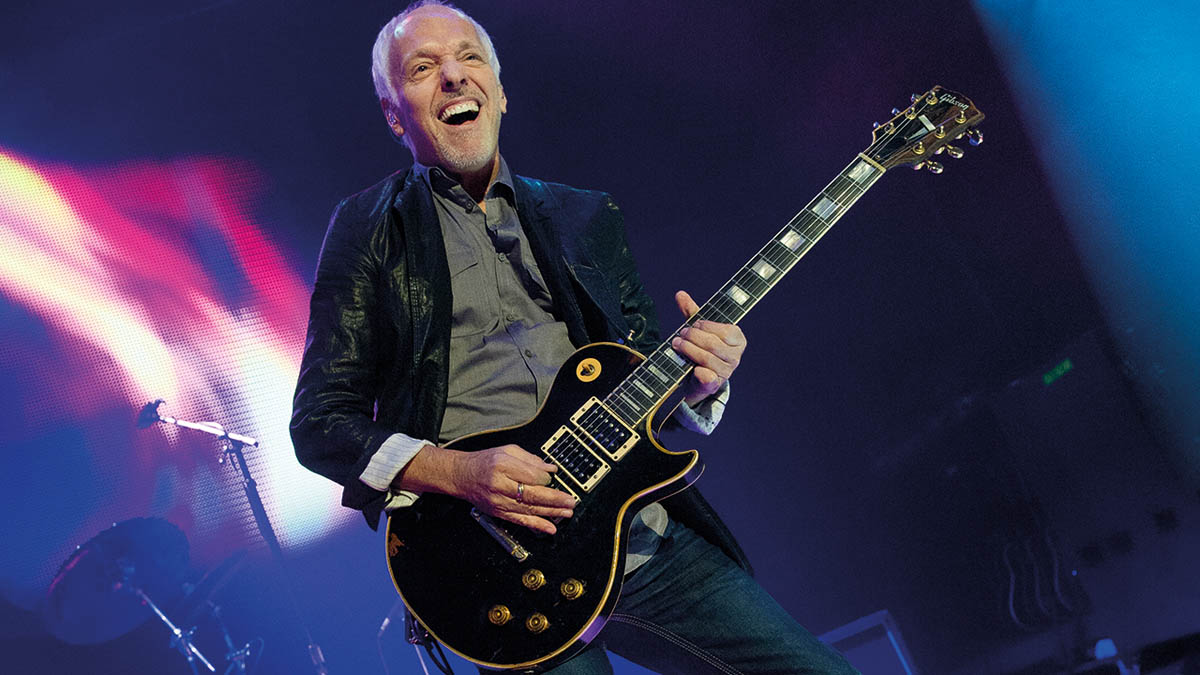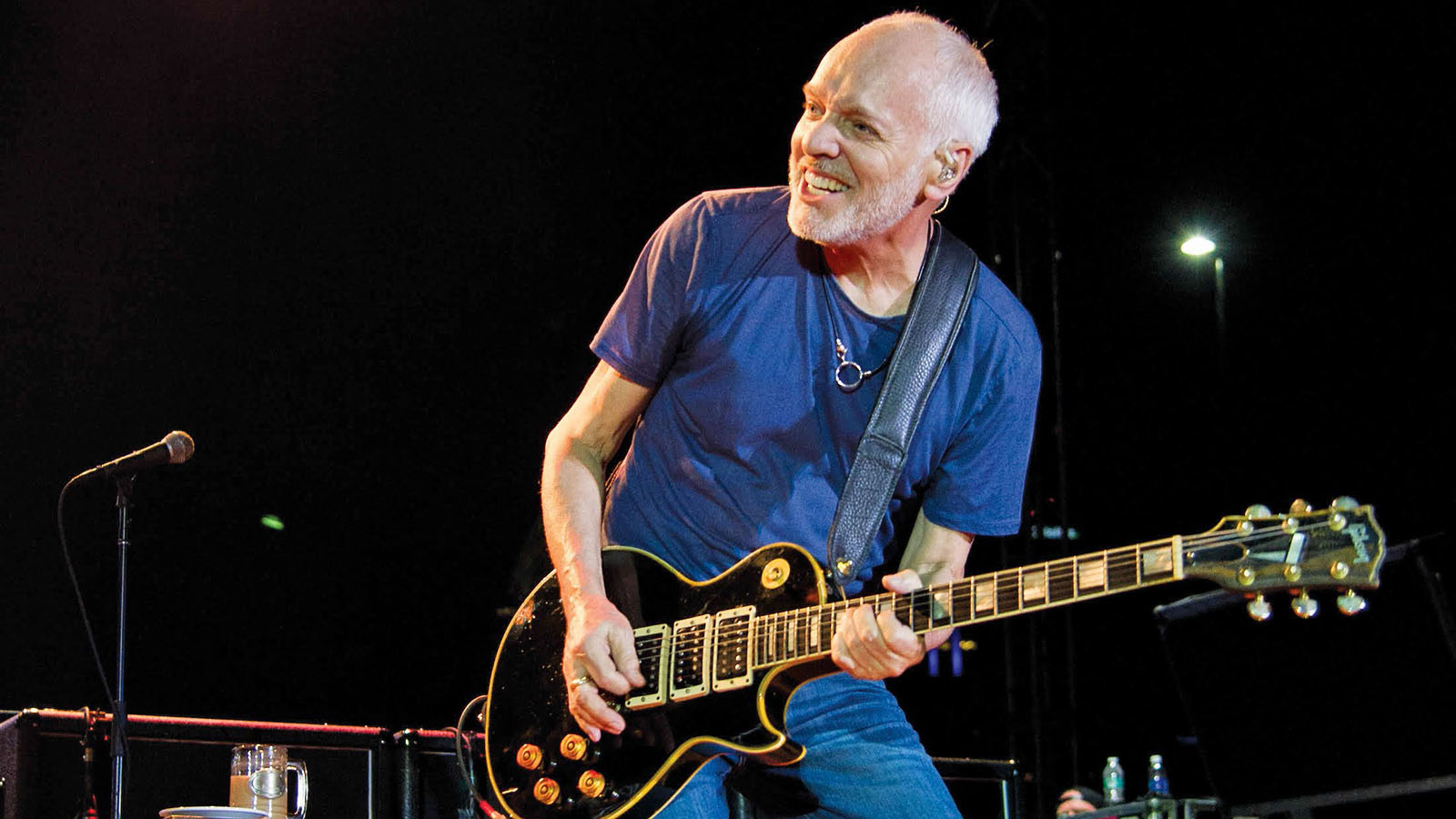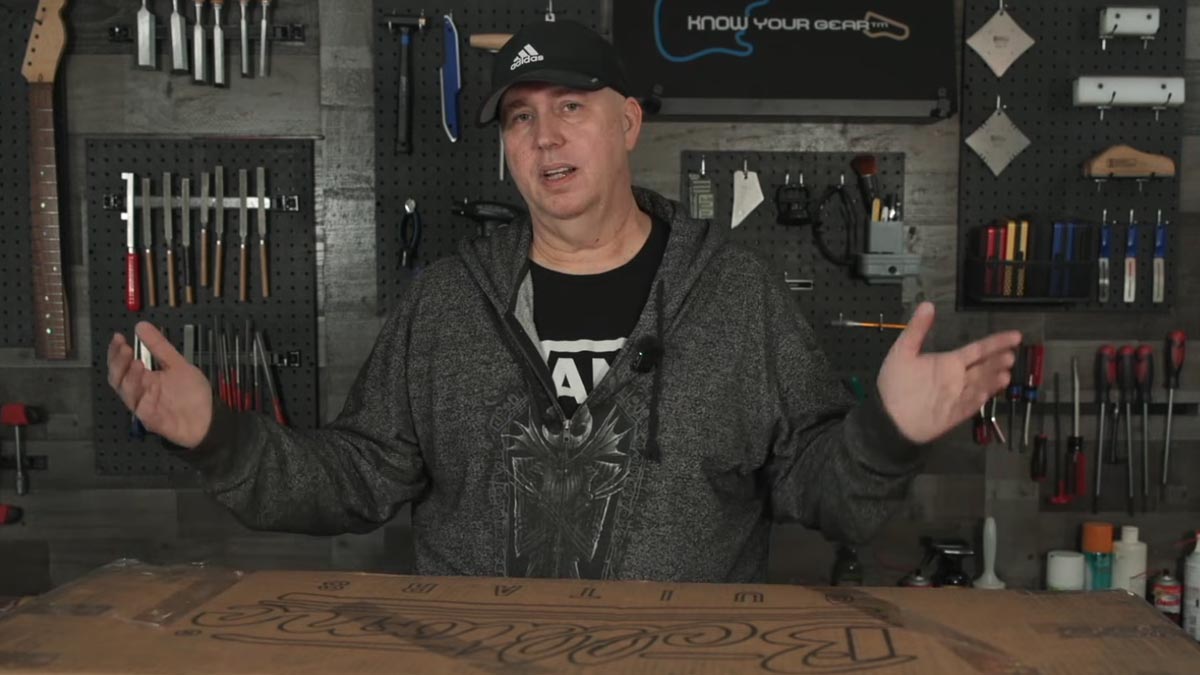Peter Frampton: “I’ve never wished to be a shredder of speed, because the notes go by so quickly you don’t enjoy them“
The talkbox-toting guitar legend discusses his new covers album, modded Marshalls and being reunited with his prized Les Paul Custom after 30 years apart

Peter Frampton's new album – brilliantly titled Frampton Forgets the Words – sees the British guitar legend tackling songs by Radiohead, Lenny Kravitz, George Harrison and David Bowie, using his instrument to replace the well-known vocal melodies of the originals.
As he explains, there’s an art to making the guitar talk. And he should know; it is, after all, what he’s been doing for decades.
One of the covers is Isn’t It a Pity from George Harrison’s All Things Must Pass, an album you played on. Harrison, along with Pete Drake, is sort of responsible – even indirectly – for introducing you to the talkbox.
“That’s true. It’s on YouTube, actually, the audio from when Pete Drake put that tube into his mouth after setting it all up, and the pedal steel started singing to us. You can hear George talking and me laughing, I think. It was just jaw-dropping. When I first heard Stevie Wonder’s Music of My Mind, he was using The Bag, made by a company called Kustom, for background voices and ad-libs.
“I thought, 'Now there’s a sound!' Then I heard Jeff Beck do a Beatles number [She’s a Woman] with it, and after that I was sitting in front of Pete Drake at Abbey Road – and I see it. He completed the circle for me. And of course the next thing out of my mouth was, ‘Where do I get one?’”
What was the answer?
“Well, he didn’t know because there weren’t any commercially available ones back then. It turns out he made it himself. After that, his wife lent that exact one to Joe Walsh, who used it on Rocky Mountain Way. I’ve spoken to Joe about this and it’s absolutely true. He went to Bob Heil, whose PAs we used in Humble Pie when starting out in America; Joe was good friends with him because they were both HAM radio enthusiasts.
All the latest guitar news, interviews, lessons, reviews, deals and more, direct to your inbox!
“Joe asked Bob to make one even louder because, as we all know, we guitarists like to turn themselves up – 'More of me!' So Bob Heil set about making one and put a much stronger driver in it so that it was capable of supporting a 100-watt Marshall for a few minutes, before it blew up. [Laughs]“
Avalon by Roxy Music is one of my all-time favorite records. I would use it to EQ my speakers on my sound system – that’s how good the album is
Looking back now, getting your hands on it was a life-changing decision.
“Definitely. But I still think the quintessential solo, the best of the best, is Joe Walsh coming in on Rocky Mountain Way. It’s phenomenal. When it goes to the four chord, he switches to slide and takes it over the top. I’m getting goosebumps just thinking about it. The talkbox was something I had to have.
“As soon as I got it, my agent told me I had to move up from the opening spot to the middle spot on a three-act show. Which was fantastic, up the ladder another run. And then I found out I was playing underneath Joe Walsh. So guess who played the talkbox first that year? I don’t think Joe was too thrilled, but we’ve laughed about it since. That was the first tour I used it on, before I’d even had a chance to record with it.“
What’s the secret to getting a guitar to replicate vocal melodies?
“I’m a melodic player at heart. Looking all the way back to the beginning, my first hero band was the Shadows. They were the first thing I listened to and learned how to play, all the hits and album tracks. I went from that to Django Reinhardt and jazz, which is very lyrical.
“My guitar became another voice of mine. For example, Avalon by Roxy Music is one of my all-time favorite records. I would use it to EQ my speakers on my sound system – that’s how good the album is. So the cover is my tribute to them, because the vocals on that album are so laid black and flown away.
“It feels like that’s the track I got the closest on, as a guitarist replicating vocals. And Reckoner by Radiohead, no one knows what Thom Yorke was singing about anyway. He’s a bit like Michael [McDonald] from the Doobie Brothers – you can’t understand what that guy’s saying!“
I wanted to pay tribute to David Bowie for giving me this incredible gift, reintroducing me to fans around the world as the musician, not the pop star
You worked closely with David Bowie during parts of your career. On this album you’ve covered Loving the Alien, which was on the setlist for the Glass Spider tour you did together.
“Exactly! That’s why I chose that track. I loved the song, but I loved most of David’s stuff anyway. That was the number he gave me for a stretched-out solo – it was my party piece on that tour. I wanted to pay tribute to David for giving me this incredible gift, reintroducing me to fans around the world as the musician, not the pop star. It was cathartic to go back to. There was a lot of passion involved on that track.“
There are some jazzy moments, too, like on the cover of Sly and the Family Stone’s If You Want Me to Stay.
“I don’t really think about or even want to know what I’m going to play. I blank my mind out and let it happen. This album was all done together live, but when I do any overdubs, we usually choose the first take or the first of a series in between breaks and cups of tea.
“I’ve never been one that relied on or wished to be a shredder of speed, because the notes go by so quickly you don’t enjoy them. For me, it’s about the choice of notes. There’s no guitar on the Miles Davis records I listen to, but it doesn’t matter because I’m listening to his choice of notes. And he’ll play one note over seven chord changes, but it’s the right note. It’s so important to me – not how many notes I play but which ones. Some people have told me I never play the same thing twice and I always say, 'I hope I never do!' That’s what I want to achieve as a guitarist.
“Every time I play a solo, even if I’ve been playing it for 20 years, I want a fresh canvas. I want to go somewhere I haven’t been before; otherwise, what’s the point? I guess I’m a jazzer at heart.“

Well, we did notice a few diminished runs on that track!
”I’m glad you noticed! That all probably comes from Django. He couldn’t go 30 seconds without playing a diminished line. I just sat down one day and said, 'Let me just learn this!' and figure out what he was doing. Since then, even on tracks like Georgia on My Mind from my All Blues record, I’ve stuck them in. I find when you are on the five chord – which is the dominant – just before you back to the one, you can throw that diminished idea right in there and have some fun.”
Gibson and I had tried for some time in the '90s to recreate the Phenix from memory. We came up with a beautiful guitar that looked exactly the same, but of course it wasn’t
You’ve been reunited with your 1954 Phenix Les Paul Custom for a while, having spent three decades thinking it had been destroyed in a cargo crash. Did that get used on the album?
“I used it for the solo at the end of Reckoner. It’s all over the album, actually. A lot of the time I would do the melody on my ’59 ES-335 and then do the solo with the Phenix. And my goodness, what a story. Things like this don’t normally happen. After 30 years, you don’t expect to see an instrument you thought went into the earth.
“We were told it went up in the fireball of the crash, but it was removed from the tail of the plane, which broke off and didn’t have as much fire. It singed, and instead of the Gibson inlay on the headstock, the bits that are left make a lucky seven. I find that very interesting! Right now I have the great Tom Holmes pickups in there and I love them, but it doesn’t matter… whatever pickup you use will sound like the solo from Lines on My Face. Gibson and I had tried for some time in the '90s to recreate it from memory.
“I tried to tell them every detail I could, like the neck size and weight. We came up with a beautiful guitar that looked exactly the same, but of course it wasn’t. I was very happy and had about three or four of them. Then I got the original back and it doesn’t sound anything like those ones.“
And you’ve generally been using three 100-watt Marshall Super Leads – one original and two built by John Suhr.
“In the '80s, I got in touch with [amp modder] Jose Arredondo. He said, 'Find me an early-'70s Marshall and I’ll make it sound great for you.' So he did, then unfortunately we lost Jose and I needed some backups. John Suhr took the Jose and reverse-engineered it for me. John is an incredible luthier, amp maker, pedal maker… he never ceases to amaze me.“
- Peter Frampton Forgets the Words is out now via UMe.
Amit has been writing for titles like Total Guitar, MusicRadar and Guitar World for over a decade and counts Richie Kotzen, Guthrie Govan and Jeff Beck among his primary influences as a guitar player. He's worked for magazines like Kerrang!, Metal Hammer, Classic Rock, Prog, Record Collector, Planet Rock, Rhythm and Bass Player, as well as newspapers like Metro and The Independent, interviewing everyone from Ozzy Osbourne and Lemmy to Slash and Jimmy Page, and once even traded solos with a member of Slayer on a track released internationally. As a session guitarist, he's played alongside members of Judas Priest and Uriah Heep in London ensemble Metalworks, as well as handled lead guitars for legends like Glen Matlock (Sex Pistols, The Faces) and Stu Hamm (Steve Vai, Joe Satriani, G3).

